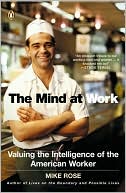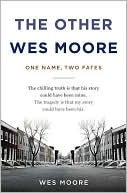The Mind at Work: Valuing the Intelligence of the American Worker
Search in google:
As did the national bestseller Nickel and Dimed, Mike Rose's revelatory book demolishes the long-held notion that people who work with their hands make up a less intelligent class. He shows us waitresses making lightning-fast calculations, carpenters handling complex spatial mathematics, and hairdressers, plumbers, and electricians with their aesthetic and diagnostic acumen. Rose, an educator who is himself the son of a waitress, explores the intellectual repertory of everyday workers and the terrible social cost of undervaluing the work they do. Deftly combining research, interviews, and personal history, this is one of those rare books that has the capacity both to shape public policy and to illuminate general readers. Publishers Weekly This groundbreaking study finds that the intelligence, integrated skills and achievements of blue collar and service workers have been consistently undermined and marginalized by cultural stereotyping. Rose (Possible Lives) finds conventional assessment of intelligence tied to social class: to IQ tests that measure formal schooling rather than capacity, and judgments that elevate "mind work" such as teaching or surgery over so-called "body work" represented by hair stylists or plumbers. Rose demonstrates, through research and personal exploration of a variety of workplaces, that cognitive ability, including perception, judgment, memory and knowledge, is employed daily in the work of laborers like welders, carpenters and drivers. He includes an extraordinarily moving biography of his mother, who used timing, concentration, strategic efficiency and a high degree of social skills in her work as a waitress. He profiles vocational teachers such as Jim Padilla, who motivates and guides his student electricians while passing on the concentration, problem-solving skills and persistence necessary to success. Rose also provides an excellent overview of the academic-vocational divide and argues that its effacement is necessary for a more democratic society. Well written and perceptive, but never dogmatic, Rose's book puts an important and generally poorly covered piece of the U.S.'s sociological puzzle in bold relief. Agent, John W. Wright of the John W. Wright Literary Agency. (Aug. 8) Copyright 2004 Reed Business Information.
Introduction : mind and work1The working life of a waitress12Styling hair313The intelligence of plumbing564A vocabulary of carpentry675Reflective technique : electrical wiring and construction1006Two livers : a welder and a foreman1167Rethinking hand and brain1418Hand and brain in school : the paradox of vocational education167Conclusion : working life195Afterword : on method217








